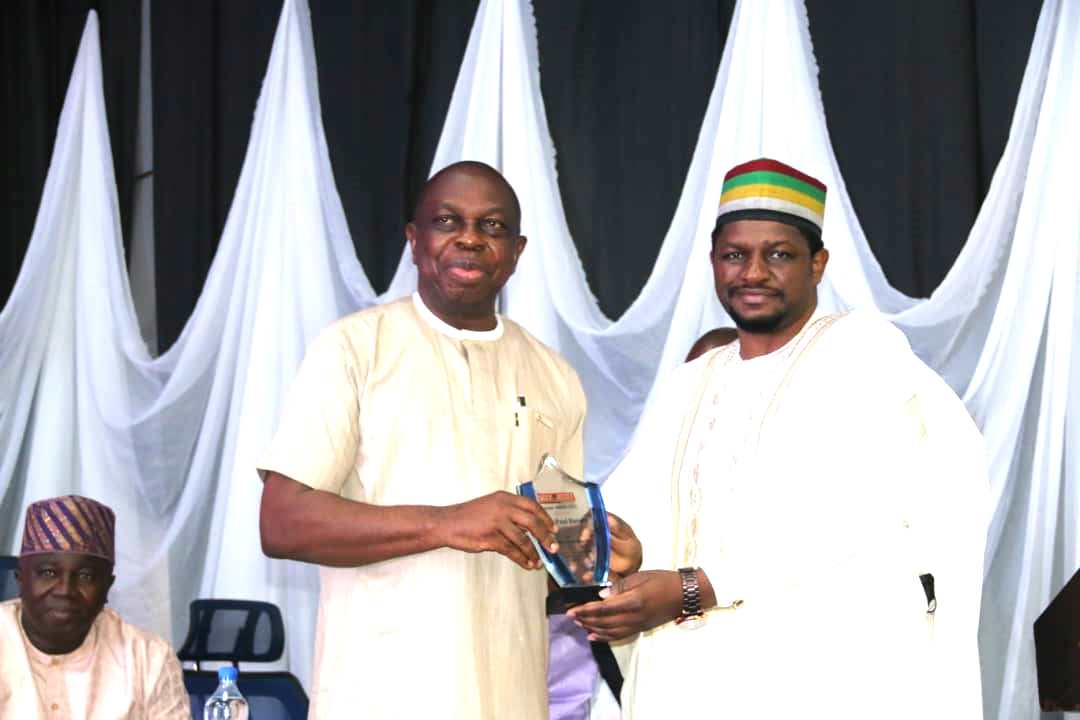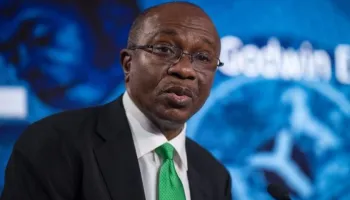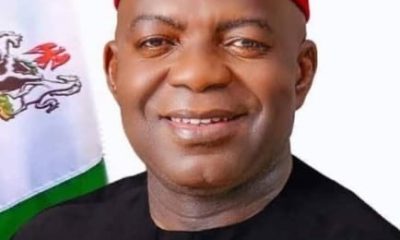COLUMNISTS
Celebrating Elder Paul Bassey

By Danusa Ocholi
Thursday February 10, 2022 will possibly go down in history as a day to remember for a long time to come. It was the day ASSET Newspapers Ltd, publishers of DAILY ASSET and its online version, marked their Fifth Annual Awards and Lecture.
It was the day some notable Nigerians and organisations were honoured.
Among them was one of Nigeria’s foremost Journalists and eminent Administrator, Elder Paul Bassey, who does not need much introduction, especially in sports circle. The high profile Akwa-Ibom state-born administrator was voted by ASSET Newspapers’ Editorial Board as its Sports Man of the Year, or better still, Sports Administrator of the Year 2021.Although his achievements as a Journalist are profound and are there for all to see, his tremendous administrative ingenuity which resulted in Akwa United FC title-winning campaign in the 2020/21 season placed him above others for the award.
Akwa United won the Nigerian Professional Football League, for last season, and the feat was a remarkable League triumph, the first in the 24 year old history of the club and the State.
Elder Bassey was accompanied to the presentation event held at NICON Luxury Hotel, in Central Area, Abuja, by his amiable wife, Helen, and some staff of Akwa United FC that included Media Manager Mfon Patrick; Mr Idara Ekong, the club’s Cashier, and Ms Mary Akpaidiok, the Accountant for the memorable event.
When the announcer for the day, Omale Orokpo formerly of Radio Benue and Radio Nigeria called on Elder Bassey to step on the podium for recognition, and to receive his plaque, the main hall of NICON Luxury Hotel was electrified, as hundreds of those at the venue, including those on the high table stood to give this Journalist cum Administrator a deserved standing ovation.
Dr Cletus Akwaya, Publisher of the group took it upon himself to read the citation of this great Nigerian. No other person could have performed this role better perhaps than Dr Akwaya who got his Phd from the prestigious Harvard University, and served as Information Commissioner, Special Adviser on Media and Publicity to Benue State Governor in two regimes in Benue state. He was also the Group Managing Director of Abuja-based Leadership Newspapers where he left to set up ASSET Newspapers, more than five years ago.
Dr Akwaya introduced the multi-talented Administrator who is fluent in seven international languages [including English, French, Italian, Russian, and Arabic] thus:”The current Chairman of Akwa United Football Club of Uyo, Elder Paul Bassey is best known as a Sports Journalist, Commentator, Analyst, and Administrator. ..Elder Bassey, popularly known in sports circle as Sports Bassey had worked as the Sports Editor of the Chronicle Newspapers Uyo, from where the Punch Newspapers in Lagos head-hunted him as their Group Sports Editor. He later got elevated as the papers’ Deputy Editor.
When Chief Emmanuel Iwuanyanwu established Champion Newspapers in 1988, Bassey was among the first set of staff to be hired by Chief Henry Odukomaya , the pioneer Managing Director . Bassey gave the paper an identity, by making Champion the first tabloid in the country to devote its entire back page to sports. He had served in CAF and FIFA committees at various times, and his popularity in these global bodies is legendary.” The citation on Elder Paul did not end there:”Bassey is married to Helen. He has three children. He is a Christian and an ordained Elder of the Apostolic Church Nigeria. Bassey had his primary school education at St.Gregory’s primary school Ikot Ebok, [1964-67] and Salvation Army Primary School Iyun Road, Lagos [1967-1969]. After his primary school education, he proceeded to St. Saint Finbarr’s College, Akoka-Lagos for his secondary school education in 1970 and obtained his Senior Secondary School Certificate in in 1975.
In 1983, he earned a Bachelor of Arts degree in Modern Languages and Linguistics from the University of Calabar. Two years later, he obtained a Masters of Arts degree from the University of Grenoble, France….” Elder Bassey’s plaque, the symbol of the award, was presented to him in a blaze of glory by a Member representing Jos South and Jos East at the House of Representatives: Rt.Hon. Dachung Musa Bogos.
The citation on the man that is referred to as “Master” by those who worked under him, he is a true patriot, intellectual giant, philanthropist, liberal to a fault; humble and a true lover of God and humanity among other virtues. May his tribe increase. But space will not permit one to reproduce all here. At this point, I wish to join hundreds of his admirers to wish this icon the best in his future endeavours. It is one’s great prayer that the country will take advantage of his enormous experience and exposure to give him higher stakes and responsibilities. His appointment as a Sports Minister of the Federal Republic of Nigeria is long, overdue, or other higher national positions.
Faith
Challenges: Baptist Convention Urges Nigerians To Move Closer To God
By Abiodun Lawal
Lufuwape (Ogun), April 27, 2025 The Nigerian Baptist Convention says individual’s closeness to God remained the greatest factor in addressing various challenges.
President of the convention, Rev. Israel Akanji, stated this at a Sunday Service held at the Baptist International Convention Centre in Lufuwape, Lagos-Ibadan Expressway in Ogun.
The News Agency of Nigeria (NAN) reports that the Baptist’s 112th Annual Convention kicked off on Saturday to end on May 1.
NAN reports that the theme of the convention is: “Entering into Newness through Fasting and Prayer”.
Akanji who took his sermon from the book of Luke 8 vs 1 to 8 , noted that prayers remained an act of faith and called on Nigerians to focus on God who solves problems rather than the problems.
He said it was important to believe in possibilities and have the conviction that only God answers prayers.
The Baptist President cited example of a widow who was not afraid, annoyed or ashamed of her challenges but kept moving until she overcame the challenges with her closeness to God.
“We should run away from factors that will make us sin against God, we should love one another. We should not allow our adversaries to make us a failure.
“We should focus on God who solves problems. Keep making attempt on your goal, don’t give up , then believe in possibilities,” he said.
Akanji emphasised that the Baptist as a movement, was entering into newness through fasting and prayer as a vehicle to be able to experience newness in their lives and the country.
COLUMNISTS
The Emefiele Mess and Rivers State’s Comedy of Errors

By Zainab Suleiman Okino
The former Governor of Central Bank of Nigeria, Godwin Emefiele finally got a respite last Friday when he was released from Kuje prison after meeting his bail conditions, but not before his alleged atrocious and unfathomable heists were made public, to his eternal disgrace.
Emefiele was arrested by the Tinubu-led government and spent 195 days in detention, while investigations into his tenure at the apex bank were ongoing.
Although the media decried his and the former EFCC chairman, Abdulrasheed Bawa’s long detentions without trial, in line with the country’s laws, by the time his trial commenced, it had become obvious that we had a juvenile-like man in charge of the trillion-dollar economy of Nigeria.It is therefore not a surprise that the economy also collapsed and all he could do was to encourage a figure-head President Buhari to borrow and borrow more.
Back to the shocking revelations shaking the fabric of the Nigeria society, Emefiele, according to the special investigator, Jim Obazee, operated 593 illegal US, UK, and China accounts and diverted £543,482, 213 into UK banks alone, in addition to his trial over N1.2 billion procurement frauds.
There are also allegations that Emefiele sold or “gave away” Union Bank, Keystone Bank and Polaris Bank to proxies and cronies in the guise of being special purpose vehicles (SPVs) for acquisition after CBN’s no objection report, which he had orchestrated.
Emefiele’s sins are many and the coming days will reveal the Tinubu-led government’s readiness to handle corruption-related issues concerning the ex-CBN governor, other key players in the previous administration, and anybody for that matter, and that includes those associated with him.
Emefiele, fresh out of prison, has sought for the further investigation of the shady deals he was accused of, while claiming that the accusations against him “are false, misleading and calculated to disparage my person and injure my character.” I hope so too and wish Emefiele good luck, because only a person with mental disorder would commit such malfeasances and hope not to be held accountable for them.
By far, the most damaging of Emefiele’s obnoxious policies was that of the naira redesign, which assumed a political dimension allegedly to stop Tinubu from emerging as president, but nonetheless had devastating consequences on ordinary Nigerians, leading to deaths and the crippling of people’s finances.
To think that the idea emanated from a former presidential aide and relation of President Muhammadu Buhari, is to take Emefiele’s loyalty to the Buhari cabal to a ridiculous extent. What exactly did Emefiele want? As a former MD/CEO of Zenith Bank before his appointment to the apex bank by ex-President Goodluck Jonathan, he should have felt accomplished enough not to allow his ambition, greed, and pressures from the cabal (no matter how powerful they are) to sway him towards unethical deeds, with far-reaching consequences on his reputation.
Again, Emefiele is fighting back, claiming he had presidential approval for the naira redesign, and that he neither operated 596 accounts, nor withdrew $6.23 million alongside former SGF Boss Mustapha. Whatever!
He was perceived as having his two hands in the national cookie jar, while the Nigerian people reeled in poverty. His disastrous political voyage did not help matters. Emefiele’s alleged financial sleaze and fleecing of the country was unprecedented and the most brazen in recent times.
But instead of being cautioned, he was encouraged by other officials of the Buhari government in an unholy alliance that only the ex-CBN governor is now paying for. With his experience in one of the biggest banks in the country, why he allowed non-professionals in government to drag him into the pit is incomprehensible.
Does it really mean there is no limit to the official corruption of top government functionaries or because the Nigerian public also condones it and collects peanuts to become their cheerleaders? So, the joke is on us as a people, if there are no mechanisms to stop financial recklessness in high places before they get to an outrageous level like that of Emefiele.
Running for the office of the president was Emefiele’s greatest undoing and the height of impunity. For this brazen arrogance, it was obvious that losing out would also lead to his waterloo. Was becoming president calculated to protect his loot and turf? To whose detriment? To prove his immunity from prosecution or that he was untouchable? If he had transmuted to the president of Nigeria, he would have made history, running for election as a sitting CBN governor, when he was supposed to be non-partisan.
That thoughtless action would have finally nailed Nigeria as a banana Republic, with far-reaching implications for the country’s image and its people. It would have also meant the diminished integrity of the country’s number one financial institution, which would have become a cash cow for his relentless financial laundering; another form of state capture, whereby corporate governance, leadership capability and personal morals are near zero. Surely Emefiele needs to do a lot to clear his name and extricate himself from the rot that happened under his leadership.
Rivers State Comedy of Errors
When last week President Bola Tinubu invited the warring personalities in the Rivers State political crisis – Governor Siminalayi Fubura and ex-governor and Minister of the FCT, Nyesom Wike – to the Presidential Villa for a truce, little did we know that instead of a thaw, the crisis would spiral into ridiculous confusions, drama, and intrigues.
However, as things stand today, only ex-Governor Nyesom Wike seems triumphant, but will his laughter last long? With President Tinubu behind him, the answer is in the affirmative. However, will Governor Fubura and the people of Rivers State live with the idea of being governed from Abuja? The reactions from River State stakeholders and interest groups so far reveal otherwise. They were mistaken to think the president meant well by the time the details of the ‘negotiation’ began to unravel.
The president neither reprimanded the 27 lawmakers who had defected to his party (APC), nor asked all parties to return to status quo ante, which would have ensured they remain in their party, dropped the impeachment of the governor idea and withdrew the legal cases against the lawmakers from the court.
As impossible as this may appear, it was the closest to a peace deal for all. But that did not happen. Instead, the president was silent on the defection. Some other details have since emerged indicating that it was a win-win deal for the strongman and minister, Wike, now in the inner recesses of the power loop of the Tinubu government.
If the PDP/Fubura drops the case of defection against the 27 lawmakers now in APC, how can the governor sleep with his two eyes closed when his impeachment can be organised and executed within an hour? So, where is the governor’s armor or shield against the unexpected? Again, many legal luminaries like Femi Falana and Chief Robert Clarke have condemned the unconstitutionality of Tinubu’s intervention and therefore it cannot hold water. As such, where do we go from here and what transpired?
A member of the Rivers Elders Forum and delegation to the Villa, Chief David Briggs, in an interview described the reconciliation effort as akin to a trick and the imposition of a one-sided resolution. “That was not a meeting. Mr President walked in with a written resolution, addressed us, and declared that what he had in his hand is a presidential proclamation.
He emphasised the fact that he is the president of the Federal Republic of Nigeria, and anybody who tends to say no to what he is saying, it has consequences. Tinubu in a simple layman’s word is a threat. He wrote the resolution but refused to read it. He handed the resolution to Dr Peter Odili to read it.”
I’m not sure Tinubu would have accepted this kind of resolution from President Obasanjo during his crises-ridden governorship with his two deputies at various times, yet that is the bitter pill Fubara is expected to swallow to avoid being impeached and to make Wike feel good.
That Rivers stakeholders are now speaking is a natural consequence of the comedy of error unfolding in their state. If the Fubara-Wike rift continues and political divides deepen, the crisis will linger and multiply. And if President Tinubu does not display sincere neutrality but shows more preference for Wike and defectors from PDP to APC, the intrigues will continue. Who will laugh last in the Rivers conundrum? The politics in Rivers State is more than humour. It has the capacity to consume the governor and create endless frictions, sadly to the detriment of the people. But then who can ever understand the game plan of politicians?
COLUMNISTS
African Tales in Engineering the Courts

By Chidi Odinkalu
At their summit in Nassau, The Bahamas, in 1985, the Commonwealth Heads of State and Governments (CHOGM), decided to establish an Eminent Persons Group to explore difficult dialogue with the Apartheid regime in South Africa. The EPG was to be led jointly by Australia’s former Prime Minister, Malcolm Fraser and Nigeria’s former military ruler, Olusegun Obasanjo.
Emeka Anyaoku, the Nigerian diplomat who would later serve with considerable distinction as Secretary-General of the Commonwealth, headed the secretariat of the EPG.In 1986, the Group undertook its first insertion into South Africa. In his memoirs, The Inside Story of the Modern Commonwealth, Chief Anyaoku narrates that the mission was underwritten by a bargain with the Apartheid regime that all persons whom it met with would suffer no reprisals.
However, in Cape Town, Chief Anyaoku recalls, Trevor Manuel, who was then one decade away from becoming Finance Minister in the post-liberation administration, ended up in a police cell the night after meeting with the delegation.On the night of Trevor’s arrest, his lawyer called to notify Chief Anyaoku about the fate that had befallen his client. It was approaching mid-night when Chief Anyaoku called Mr. van Heerden, the liaison between the delegation and the South African regime, to accuse them of breaching the understanding at the very heart of the mission. Mr. van Heerden promised to investigate. Less than one hour later, according to Chief Anyaoku, Mr. van Heerden called him back to confirm that Trevor Manuel was indeed detained in a police cell.
In response to Chief Anyaoku’s insistence that Trevor be promptly released, Mr. van Heerden volunteered that he would be granted bail overnight to appear “before Magistrate Court No. 13 the following morning.” According to Chief Anyaoku “Mr. van Heerden then went on to tell me that, once the case was called, it would immediately be adjourned sine die…. I thereafter told him that I would make discreet use of the information he had given me. He interjected that I should please note that his ‘government and security services do not interfere with the judicial processes.’ I said, ‘of course, I know you don’t!’ and we both laughed.”
In a testament to Mr. van Heerden’s powers as a gifted clairvoyant, the court proceedings the following morning went exactly as he had predicted. His gods had engineered the courts.
Apartheid South Africa did not enjoy a monopoly of such gifts of judicial engineering. In November 1992, longtime trade Union leader, Frederick Chiluba, unseated independence ruler, Kenneth Kaunda, to emerge as the first president of a multi-party Zambia. His party was presciently named the Movement for Multi-Party Democracy, MMD.
The year after President Chiluba’s ascent to power, the office of Chief Justice became vacant after the country’s first indigenous Chief Justice, Annel Musenga Silungwe, quit the office at the age of 57. To succeed him, Chiluba appointed Matthew Ngulube. At the time, Zambia’s judges were poorly paid, a legacy from the era of Kaunda’s one-party state. Chief Justice Ngulube quickly became a darling of the international conference circuit, traveling the world and delivering homilies on judicial independence.
As his second five year term of office came to an end, President Chiluba contrived a plan to succeed himself. Armed with a judiciary which he believed to be in his pocket, Chiluba believed he could overcome a constitutionally imposed term limit and run for a third term. Zambians declined his importunation, turfing him out in 2001 in favour of senior lawyer and Chiluba’s own former Vice-President, Levy Mwanawasa.
At the beginning of President Mwanawasa’s tenure, it emerged that Chief Justice Ngulube’s preferred habitation was in Chiluba’s pocket. Once there, he burrowed himself into the favours of the former president, festooning himself with choice goodies, which enabled him to afford an extraordinary mansion on the outskirts of capital city Lusaka, valued at the annual budget of major government departments. He also trousered a reported $168,000 to finance his tastes, including school fees for his children in order to “buy his loyalty”. Decisions in all cases against Chiluba suddenly became fully engineered. When, for instance, the opposition sued Chiluba – suspected to have descended from the Democratic Republic of the Congo (DRC) – over his nationality, the Chief Justice acted more like the president’s counsel than an impartial judge.
Zambia was not the only place where judges preached independence but failed to practice it. In Malawi, government engineered judges with generous awards of sugar distribution quotas.
In Nigeria, the revolutionary decision by the Supreme Court in January 2020 to award the governor’s office in Imo State to a man who had been well beaten to fourth position in the election conducted the previous year, was trailed a fortnight earlier by a grubby “man of god” with a nose for predicting only what the politicians pay him to.
Last year, as Zimbabwe headed towards elections conducted earlier this year, President Emerson Mnangagwa, overcome with unparalleled generosity, doled out $400,000 to each of the country’s judges claiming that it was a housing loan in a country in which a luxury home cost about 20% of that sum or less. By coincidence, Priscilla Chigumba, Chairperson of the electoral commission, which was to supervise the vote, just happened to also be a judge. The outcome was foregone.
Around Africa, the encounter with elective government has cratered assumptions about judicial integrity and independence. As a result, few are prepared these days to credit judges with virtues associated with Caesar’s wife. In many cases, judges now openly cavort with politicians and are unashamed about serving the interests of ruling parties, rather than holding them to account. The consequences can be brutal.
In April 2020, Mali’s Constitutional Court overturned the results of more than two dozen parliamentary seats won by the opposition. Its decision to hand these seats over to the ruling party sparked an uprising that led to the government’s overthrow. When the court was busy robbing the opposition of its seats,
the Economic Community of West African States (ECOWAS) and the African Union (AU), looked complicitly on. After the uprising had been consummated in a coup, they got their institutional knickers in a proverbial twist, protesting the travails of non-existent democracy.
Judges who refuse to be so readily engineered can suffer intimidation. In Malawi, former president Peter Mutharika launched an unprecedented attack on the judiciary after the Supreme Court upheld a Constitutional Court decision annulling his re-election and ordering re-run after finding the election to have been massively rigged. In what appeared to be an act of political reprisal, the president, himself a former law professor of considerable experience, moved to oust the Chief Justice, Andrew Nyirenda and another senior justice, Edward Twea, by ordering them to take compulsory leave ending in retirement. Tens of thousands of Malawians, led by hundreds of lawyers, protested in support of the judges. On 14 June 2020, the High Court suspended the presidential order, staying the ouster of Nyirenda and Twea. The people of Malawi did the rest, seeing off the forgettable tenure of Peter Mutharika in the re-run that ensued.
Some judges may even pay with their lives. Such was the tragic fate of Congolese judge Raphael Yanyi, who presided over the unprecedented trial for corruption trial of Vital Kamerhe, the Chief of staff to the president. On May 26, 2020, Judge Yanyi, who was supposed to be under close protection from a team of six specially-trained police officers, died suddenly. The police initially claimed that the judge died of a heart attack “but an autopsy report revealed that he died from knife-like injuries to the head” or what the Justice Minister described as “the blows of sharp points or knife-like objects, which were thrust into his head.” Far from dying of natural causes, it was clear that Judge Yanyi had been murdered.
Wise judges work hard to avoid this fate with benefits. In the past, judicial greatness was calibrated in the currency of jurisprudence. Today, many of Nigeria’s senior judges prefer to measure their success in terms of propinquity to power and impunity with planting their children and intimates on the bench. That is the local currency of judicial engineering.

















